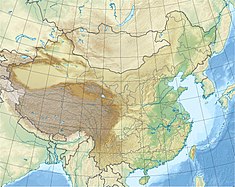Daya Bay Nuclear Power Plant
| Daya Bay Nuclear Power Plant | |
|---|---|

Daya Bay nuclear power plant
|
|
| Country | People's Republic of China |
| Location | Longgang District, Shenzhen, Guangdong |
| Coordinates | 22°35′50″N 114°32′40″E / 22.59722°N 114.54444°ECoordinates: 22°35′50″N 114°32′40″E / 22.59722°N 114.54444°E |
| Status | Operational |
| Commission date | Unit 1: August 31, 1993 Unit 2: February 2, 1994 |
| Operator(s) | Guangdong Nuclear Power Joint Venture Company (GNPJVC) |
| Nuclear power station | |
| Reactor type | PWR - CPR-1000 (M310) |
| Reactor supplier | China Guangdong Nuclear Power Group |
| Power generation | |
| Units operational | 2 x 944 MWe (net) 2 x 984 MWe (gross) |
Daya Bay Nuclear Power Plant (Chinese: 大亚湾核电站; pinyin: Dàyàwān Hédiànzhàn) is a nuclear power plant located in Daya Bay in Longgang District, Shenzhen, Guangdong, China; and to the north east of Hong Kong. Daya Bay has two 944 MWe PWR nuclear reactors based on the Framatone ANP French 900 MWe three cooling loop design, which started commercial operation in 1993 and 1994 respectively.
In 1985, the building of Daya Bay nuclear power plant incited controversy and led to objections from prominent politicians in nearby Hong Kong, such as Martin Lee and Szeto Wah, legislative councilors, district board members. A million people, or one fifth of Hong Kong's population at the time, signed a petition opposing nuclear power. Over a hundred community groups brought discussion on the construction, with the opposition primarily focusing on environmental issues and the rights of Hong Kong residents.
Unit 1 began power operations on August 31, 1993, and Unit 2 began power operations on February 2, 1994. The reactors were designed and built by the French National Company, Framatome, with Chinese participation. The plants are named Guangdong-1 and Guangdong-2 in the IAEA PRIS database.
...
Wikipedia

